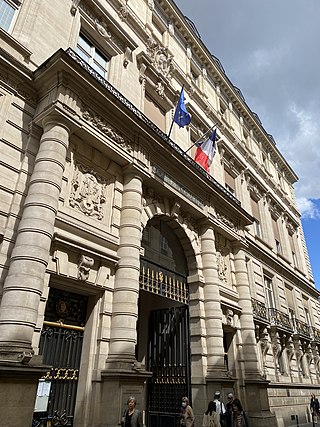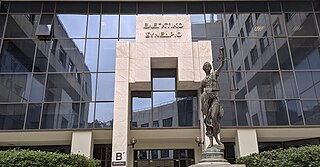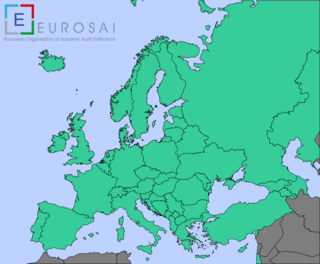
The Auditor General of Canada is an officer of the Parliament of Canada to aid accountability and oversight by conducting independent financial audits of federal government operations. These audits provide members of parliament with objective evidence to help them examine the government's activities and hold it to account.

The National Audit Office (NAO) is an independent Parliamentary body in the United Kingdom which is responsible for auditing central government departments, government agencies and non-departmental public bodies. The NAO also carries out value for money (VFM) audits into the administration of public policy.

The Cour des Comptes is France's supreme audit institution, under French law an administrative court. As such, it is independent from the legislative and executive branches of the French Government. However, the 1946 and 1958 French constitutions made it the Court's duty to assist the Cabinet and Parliament in regulating government spending. The Court thus combines functions of a court of exchequer, comptroller general's office, and auditor general's office in common-law countries. It is also a Grand Corps of the French State and mainly recruits among the best-ranked students graduating from the Ecole nationale d'administration.
Government performance auditing focuses on improving how governments provide programs and services. While there is no one universally agreed upon definition, there are key definitions which capture the scope of government performance auditing. According to the US Government Auditing Standards, "Performance audits are defined as audits that provide findings or conclusions based on an evaluation of sufficient, appropriate evidence against criteria." Additionally, the International Organization of Supreme Audit Institutions defines performance auditing as "an independent examination of the efficiency and effectiveness of government undertakings, programs or organizations, with due regard to economy, and the aim of leading to improvements.

The Supreme Audit Office is the supreme audit institution and also one of the oldest state institutions in Poland, created under the Second Republic on February 7, 1919, barely 3 months after the restoration of Poland's independence. It was created on the initiative of the Head of State, Józef Piłsudski. Its organisation and functioning are set out in the Constitution of the Republic of Poland and the NIK Act of 23 December 1994. The NIK is subordinate to the Sejm and it acts in accordance with the principle of collegial responsibility. The NIK is headed by the President who is appointed by the Sejm for a six-year term of office. The NIK performs audits related to, primarily, the execution of the state budget as well as public finance spending and management of public property by state and local governmental bodies and economic entities. Every year, the NIK submits three key documents to the Sejm: the analysis of the state budget execution and monetary policy guidelines, the opinion on the vote of discharge for the Council of Ministers and the annual report on the NIK’s activity.

In Greece, the Hellenic Court of Audit is the supreme audit institution of the Hellenic Republic, auditing the use of public funds in Greece according to the principles of legality, regularity and sound financial management. Synedrio is also the Supreme Financial Court, one of the three Supreme Courts of Justice, grounded on the Constitution, provides for its jurisdictional, advisory and auditing competences.
An auditor general, also known in some countries as a comptroller general or comptroller and auditor general, is a senior civil servant charged with improving government accountability by auditing and reporting on the government's operations.
The Controller and Auditor-General is an Officer of the New Zealand Parliament responsible for auditing public bodies. John Ryan began his seven-year term as Controller and Auditor-General on 2 July 2018. The Deputy Controller and Auditor-General is Andrew McConnell. Their mandate and responsibilities are set out in the Public Audit Act 2001. They are appointed by the Governor-General on the recommendation of the House of Representatives.

The International Organization of Supreme Audit Institutions (INTOSAI) is an intergovernmental organization whose members are supreme audit institutions. Nearly every supreme audit institution in the world is a member of INTOSAI. Depending on the type of system used in their home country, the members of INTOSAI may be variously titled the Chief Financial Controller, the Office of the Comptroller General, the Office of the Auditor General, the Court of Accounts, or the Board of Audit.

European Organization of Supreme Audit Institutions (EUROSAI) is a European intergovernmental organization whose members are supreme audit institutions in their respective countries. It is one of the seven regional working groups of the International Organization of Supreme Audit Institutions (INTOSAI).
A supreme audit institution is an independent national-level institution which conducts audits of government activities. Most supreme audit institutions are established in their country's constitution, and their mandate is further refined in national legislation. Supreme audit institutions play an important role in providing oversight and accountability in a country by monitoring the use of public funds and reviewing the quality and accuracy of government financial reporting. They also contribute to anti-corruption efforts. Depending on the country, a supreme audit institution may be called a court of audit, auditor-general or the board of audit. Nearly every supreme audit institution in the world is a member of the International Organization of Supreme Audit Institutions, which works to establish and disseminate international standards and good practices.

The Office of the Comptroller and Auditor General of Bangladesh (CAG) is the supreme audit institution of the country. Like the SAIs in many other countries across the world, the institution is established by the Constitution of Bangladesh. This institute is responsible for maintaining accounts of the republic and auditing all receipts and expenditure of the Government of Bangladesh, including those of bodies and authorities substantially financed by the government. The reports of the CAG are discussed by the Public Accounts Committee, which is a standing committee in the Parliament of Bangladesh.
Vijayendra Nath Kaul was the tenth Comptroller and Auditor General of India (CAG) from 2002 to 2008. He was awarded the Padma Bhushan in 2014.
The Comptroller and Auditor General (C&AG) is the constitutional officer responsible for public audit in Ireland. The Office of the Comptroller and Auditor General is the public audit body for the Republic of Ireland and is headed by the C&AG.
The State Audit Office of the Republic of Latvia is a public auditing body overseeing the finances of national and local government in Latvia. It was first created in 1918, and re-established in 1992 when Latvia again became independent.
The Organization of Latin American and Caribbean Supreme Audit Institutions (OLACEFS) is an international, autonomous, independent, apolitical and permanent organization. Its origins can be traced back to the First Congress of Latin American Supreme Audit Institutions - CLADEFS - held in 1963 in Caracas, Venezuela, in response to the need for a forum for exchanging ideas and experiences relating to government control, and for promoting cooperation and development between supreme audit institutions. At the Congress it was recommended that a Latin American Institute of Fiscal Control be created to carry out specialized research and serve as a center for information, education, coordination and mutual assistance between audit institutions.
Kwasi Anin-Yeboah is a Ghanaian judge and the immediate past Chief Justice of Ghana. In December 2019, President Nana Addo Dankwa Akufo-Addo nominated Justice Anin-Yeboah as the Chief Justice of Ghana.
The auditor-general of Ghana is the head of the Ghana Audit Service, a legislative branch agency re-established by the government of Ghana in 1992 through the 1992 Constitution of Ghana. It was established as part of the Audit Service through Article 188 of the 1992 Constitution of Ghana as part of the Public Services of Ghana. The auditor-general through the Audit service undertakes audits of the public accounts of Ghana and all public offices as mandated by Article 187 of the 1992 Constitution of Ghana.
Daniel Yaw Domelevo is a Ghanaian accountant who currently serves as a Board member of the Global Fund. He is a former Auditor-General of Ghana. He was appointed by John Dramani Mahama in 2016 to replace Richard Quartei Quartey who had retired from Public service. He won the 2019 Integrity Personality Award at the 2019 Ghana Integrity Initiative awards.
Richard Quartei Quartey is a Ghanaian accountant who served as the Auditor-General of Ghana from 2009 to 2016 and vice-chair of the UN's Independent Audit Advisory Committee in 2020.








